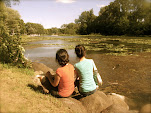08/28 抄書
The old dramatic pattern, with its concept of linear history moving the human race ineluctably to its goal in the modern world, depended on concealed principles of transcendence inappropriate to the human understanding of human affairs. The trinity of acts composing the great drama of human history and its concept of the modern epoch as not just the latest but the last act of the play bear witness to its eschatological origins, and such notions seem to me peculiarly inappropriate to so human an enterprise as that of the historian. But I also find the traditional scheme unsatisfactory because it is not dramatic enough. It fails to accommodate the sense of contingency and, therefore, suspense - the sense that the drama might have turned out otherwise - that belongs to all human temporal experience. Though it has survived for over five centuries, for example, I see no reason to assume that the anthropological vision we owe to the Renaissance is destined to triumph forever over the forces arrayed against it, and much in the modern world suggests the contrary.
But the more human concept of the drama of history that had its effective origins in the Renaissance understanding of culture overcomes these various disadvantages. Its pluralism implies the possibility of a multiplicity of historical dramas, both simultaneous and successive; and so it relieves us of the embarrassment, inherent in a linear and eschatological vision of time, of repeatedly having to reclassify in other terms what for a previous generation seemed modern. Since it perceives history as a part of culture and also, therefore, a human creation, it permits us constantly to reconstruct the dramas of history and so to see the past in fresh relationships to ourselves. Above all, since it insists on no particular outcome for the dramas of history, it leaves the future open.
-- William J. Bouwsma, "The Renaissance and the Drama of Western History", in idem., <A Useable Past>, pp. 361-2.
But the more human concept of the drama of history that had its effective origins in the Renaissance understanding of culture overcomes these various disadvantages. Its pluralism implies the possibility of a multiplicity of historical dramas, both simultaneous and successive; and so it relieves us of the embarrassment, inherent in a linear and eschatological vision of time, of repeatedly having to reclassify in other terms what for a previous generation seemed modern. Since it perceives history as a part of culture and also, therefore, a human creation, it permits us constantly to reconstruct the dramas of history and so to see the past in fresh relationships to ourselves. Above all, since it insists on no particular outcome for the dramas of history, it leaves the future open.
-- William J. Bouwsma, "The Renaissance and the Drama of Western History", in idem., <A Useable Past>, pp. 361-2.
Labels: history


